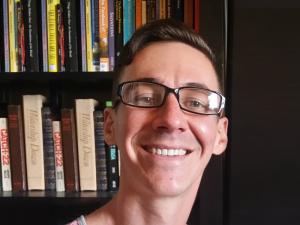
Leslie Nease’s Honoring the Journey: The Deconstruction of Sister Christian offers an intimate glimpse into a deeply personal and spiritual unraveling. As someone who has walked the path from fervent evangelical to a compassionate, questioning deconstructionist, Nease invites readers on a raw, vulnerable exploration of what it means to shed toxic beliefs in favor of a more expansive love. It’s a narrative that blends memoir, theology, and a deep dive into the emotional landscape of someone who grew up in the evangelical bubble, only to find herself suffocated by its narrowness.
In typical Nease style, the book starts by grounding us in her early experiences with faith, where salvation was paired with a suffocating fear of hell. Growing up in a fundamentalist home, her early encounters with evangelicalism were steeped in the binary—saved or damned, righteous or sinful. Nease recounts how these teachings left her in a state of perpetual anxiety, particularly around her role as a mother and wife, where she constantly feared that her failings might condemn not only herself but her children to eternal damnation. This theme of fear-based religion echoes throughout the early chapters, offering a relatable account for those who grew up with similar teachings.
One of the more striking parts of Nease’s story is her time on Survivor. For most, appearing on a reality TV show would be an exhilarating accomplishment. Yet, Nease frames her time on Survivor: China as a turning point in her spiritual journey. As she lived in harsh conditions with people from vastly different backgrounds, Nease began to see the cracks in the rigid belief system she once held dear. Here, the book touches on a key moment when her perception of others—particularly people outside the Christian faith—begins to shift. Instead of seeing them as objects of evangelism or souls to be “saved,” she started seeing them as fully human, deeply lovable, and not defined by the evangelical litmus test of salvation.
This shift becomes even more pronounced when she discusses her relationship with Todd Herzog, a gay Mormon flight attendant who became one of her closest friends during the show. Their bond challenges her previous assumptions about sexuality, faith, and what it means to be a “good Christian.” Nease’s account of how her initial reaction to his coming out (“I guess you hate me now because you’re a Christian”) opens her eyes to the harm caused by her tradition’s narrow definition of love. This realization lays the foundation for her deconstruction—a process she describes as both painful and liberating.
The strength of Honoring the Journey lies in its authenticity. Nease doesn’t claim to have all the answers, and she doesn’t shy away from the emotional turmoil that deconstruction often brings. Her vulnerability is evident when she speaks of how difficult it was to step away from a faith community that had once been her entire identity. Yet, this vulnerability is paired with resilience, as Nease gradually embraces a new understanding of God—one rooted in love, not fear. She moves away from a punitive view of God and towards a belief in a divine presence that transcends the rigid categories she was taught.
What makes Nease’s story compelling is her insistence that love, not doctrine, should be the ultimate guide. As she recounts in the book, her eventual departure from evangelicalism wasn’t about rejecting Jesus but about rejecting the toxic theology that had clouded her understanding of God. Her journey echoes the sentiment many deconstructionists share: it is not a rejection of faith but a deeper dive into the core of what faith truly means.
In Honoring the Journey, Leslie Nease offers readers more than just a story of deconstruction; she provides a road map for those grappling with their own faith journeys. Her courage to question, to break free from toxic beliefs, and to reimagine a faith that is inclusive, loving, and compassionate is both inspiring and challenging. This book is a must-read for anyone seeking to reconcile their spirituality with the messy, beautiful realities of life beyond the evangelical bubble.
Also, if you’ve been digging my work on here, and want to see me be able to continue writing as close to full-time as humanly possible, please take a look at my Patreon page at www.patreon.com/mjdistefano. Even $1 a month helps bigly!














